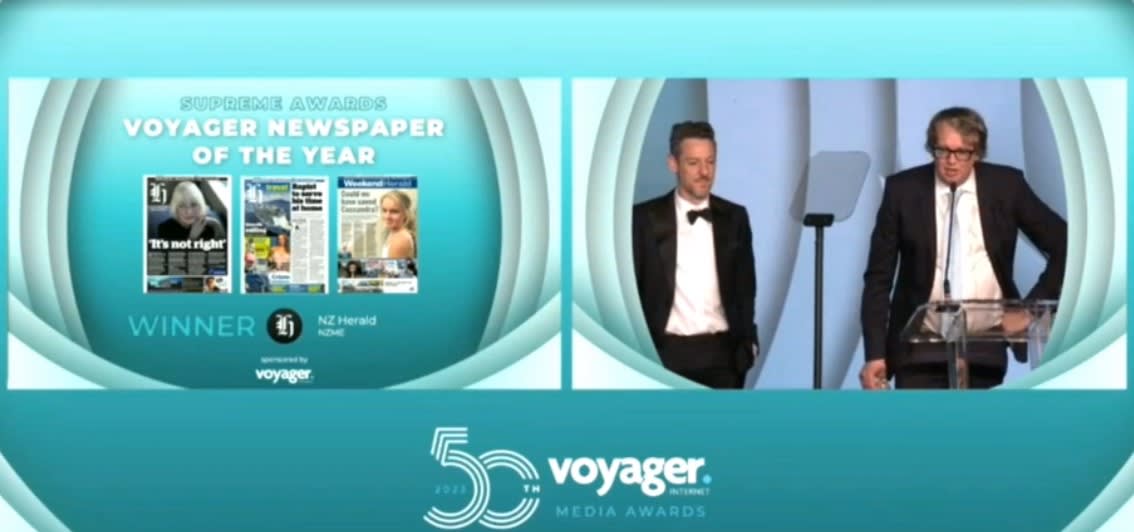
MediaRoom: Jobs with the title 'editor' at one of our big media firms appear to be an endangered species as business restructuring rolls out
Analysis: Major news organisations continue to abolish roles in the senior editorial ranks as cost-cutting and digital transformation become a priority in a weak economy.
Both New Zealand Herald publisher NZME and its rival Stuff have been restructuring, beginning with senior ranks, and increasingly the changes are seeing the de-emphasising of one of journalism's best known words – 'editor'.
In both cases the media firms are moving their priorities away from their print editions – the daily Herald and, for Stuff, the newspapers The Post, Waikato Times and The Press – to areas of audience and potential revenue growth in digital formats.
Newspaper sales have been on a long drift down as readers access news via websites, social media platforms, audio on demand and newsletters. NZME still expects its newspaper division to be profitable past 2030 and has told staff it wants to still do "beautiful" newspapers but is making them into a standalone operation, with fewer senior editors and highly templated story lengths, layout and shared content.
READ MORE: * NZ Media cleared in Posie Parker coverage * MediaRoom: Low-tide financially for TV companies
At the Herald, 12 roles are going, including the jobs of those who edit the print editions at night, and editors of both the Weekend Herald and Herald on Sunday - plus the people in charge of content for the nzherald.co.nz website at various times of the day, and even premium 'vertical' sections and magazines.
Under what is known as Project New Horizon, 11 new roles with different duties are being created, with one loss.
But some staff believe five of the 11 roles could end up being filled by people for the Herald's conjoint media twin, Newstalk ZB. Some of the roles are relatively lower-ranked reporting jobs and unlikely to entice senior editors to apply.
So up to half a dozen of the senior decision-makers currently at the Herald could be either out of a job or choose not to seek a lesser, hybrid role.

Restructures can be blunt instruments. To some cost-cutting managements, lining up higher salaries for restructuring is akin to re-ordering an email inbox by the messages with the biggest attachments and cutting the largest.
Further restructuring at NZME is likely after the senior job-crunching, as the print and digital divisions separate organisationally.
Restructurings have been roiling the publishing industry for decades. They are often cyclical, with restructures to integrate teams later reversed in favour of separation and specialisation, and out-sourcing of functions then dumped, in favour of in-house editorial roles.
The rationale for this new operating model is to have more of a digital-first focus, while dedicating what could be seen as a twilight team to oversee an ongoing decline in print advertising and subscriptions.
The first indication of the Herald reforms was when former managing editor Shayne Currie stepped down in March at a week's notice, to become editor-at-large (he got to keep the 'e' word). Former Herald editor Murray Kirkness was promoted in June, with the new moniker of Chief Content Officer, Publishing. That CCOP role no longer reports to NZME's chief executive but to an executive at the next tier down.
Separately, the Herald's head of premium content and former Weekend Herald editor Miriyana Alexander departed at the end of August for personal reasons.
Those involved in the editor-level restructuring round are still involved in consultations, although some have already opted out and are leaving the building. A Zoom meeting to answer any further questions is planned for Friday and the new operating model is hoped to be in place in less than a fortnight.
Reporters and writers, classed as content producers, are said to be protected for now from the reforms going on at the upper echelons. Some are reassured after hearing nothing, as it had been indicated those affected would be personally contacted.
Internal messaging has shifted the rationale for the restructure away from cost-cutting, and emphasised the goal of taking advantage of digital opportunities.
There has been some concern internally at the proposal's lack of an 'editor' figure as the leader and final decision-maker at the various titles and within functions.
Staff pushed back over the removal of such roles for the Weekend Herald, Herald on Sunday, Canvas and other titles.
NZME told its newsroom it had heard the feedback over titles and would change some to reflect "our heritage and the mana associated with them."
There was also pushback from staff on the use of the term 'content' rather than 'journalism' in the company's proposals.
NZME told shareholders and analysts in August that $3.9m had been saved in costs in the first half of the year. Chief executive Michael Boggs said revenues had been down year-on-year for many months and cost management was a priority. "We are always looking at opportunities where we can be more efficient across the business."
At Stuff, the business was split into three entities – Stuff Digital, Stuff Masthead Publishing and Stuff Brand Connections – each with their own managing director working to build a new business model.

The then-ranking journalist at Stuff, head of news Mark Stevens, left during the subsequent restructure to take a role at RNZ as Chief News Officer, and The Post's inaugural editor Caitlin Cherry also departed after five months.
Stevens' replacement at the Stuff website, Keith Lynch, is one to retain the 'e' word in his title as editor-in-chief, in a slimmed down role. Cherry's editor job was subsumed into a combined role editing The Post and the Sunday Star-Times and held by Tracy Watkins.
Stuff journalists are still coming to grips with the split of their company's functions, with some seeing their work appear only behind the sub-site paywalls The Post, The Press or The Waikato Times and not on the main Stuff site, the country's best read outlet. One said it was difficult to know if teams were supposed to cooperate or compete with stories, given their different destinations and audiences.
Strict delineations between teams working on print products and digital sites are said to be in place, with some staff on newspapers now not able to access their digital colleagues on internal Slack messaging groups.
Restructuring moves are said to be continuing, months into the process, with several insiders commenting that lines of reporting – who-runs-what and who makes the critical 'editor' decisions – are unclear. Stuff has also lost its former climate editor Eloise Gibson to RNZ, #MeToo NZ project leader Alison Mau and the former Dominion Post editor Anna Fifield.
(At TVNZ, the senior role has bucked the 'editor' trend, with Phil O'Sullivan taking the title Executive Editor, News and Current Affairs when assuming the position last year when the previous head of news and current affairs departed. At Newshub, the leader of its newsroom, Sarah Bristow is known as Senior News Director for Warner Bros Discovery NZ.)
*An obvious declaration: I was editor of the Herald 2001-05 and editor-in-chief 2005-15. I am one of two co-editors of Newsroom.co.nz







